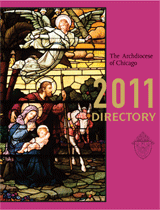Immigrant needs focus of new archdiocesan office

A regular feature of The Catholic New World, The InterVIEW is an in-depth conversation with a person whose words, actions or ideas affect today's Catholic. It may be affirming of faith or confrontational. But it will always be stimulating.
Elena Segura has spearheaded the Archdiocese of Chicago’s immigration reform efforts since the launch of the Catholic Campaign for Immigration Reform in 2005, at a time when it appeared that there was a real possibility that a comprehensive reform package would pass in short order. Those efforts were under the auspices of the archdiocesan Office for Peace and Justice.
Four years later, the U.S. Conference of Catholic Bishops and the archdiocese are still pushing for such reform, and the archdiocese has taken the further step of creating the new Office of Immigrant Affairs and Immigration Education with Segura as its director. The new office is part of the Department of Evangelization, Catechesis and Youth Ministry, as is the Office for Peace and Justice.
Segura spoke about the goals of the new office with assistant editor Michelle Martin.
Catholic New World: Why was it important to create the new office now?
Elena Segura: The reason is the understanding of the importance of immigrants and immigration. Almost 50 percent of the church in Chicago consists of immigrants, and the issue of immigration is important to the fortunes of the Catholic Church in the United States.
We needed to respond to continue the work the U.S. bishops started in 2005, which had two goals: one, to educate the Catholic community about the benefits of immigrants and immigration; and two, advocacy efforts for comprehensive immigration reform.
When the Catholic Campaign for Immigration Reform was launched, the bishops were hoping that the law (changing the immigration system) would pass soon. In 2007, the law did not pass, but undocumented people are still in our midst.
These undocumented people are fearful to go to work, are facing raids and lack basic services, even at the local level or the parish level. People are facing the question of what to do, what not to do, what their rights are, what resources there are, so there is the need to educate immigrants, accompany them.
Our work is charity and justice together.
CNW: What is the office doing?
Segura: We’ve already started two main programs, advocacy and education. There is education for the non-immigrants and education for the immigrants, in Spanish the “pastoral migratoria.”
This is for all immigrants, not just for Hispanics. It is for Polish — we had a meeting with 20 Polish priests about how to serve the Polish immigrants, for Asians and for Africans. The African community is very small, but we are connecting with them.
Our work is to walk with immigrants in their process of adjusting to this country, to provide basic information and resources to them.
We’re working with the Office of Catholic Schools, with the Office for Catechesis, we have a bank of speakers available.
We are working with four Catholic universities — Loyola, DePaul, St. Xavier and Dominican — to hold a conference on immigration for students on Oct. 23. It will be at DePaul, but all four are working together and it is open to everyone. We have people coming from Northwestern University and the University of Illinois.
We’ll continue to work with the schools and continue with our liturgical calendar, with materials for the different liturgical seasons.
Dominican Father Chuck Dahm just went to a breakfast on the North Shore that someone organized for 30 people, and we sent a woman from Waukegan to tell her personal story.
These are the parables, the personal stories … when we talk about transformation of hearts and minds, it’s in their stories. And they are full of faith.
They talk about Our Lady of Guadalupe and the struggles they have everyday. How they pray to Our Lady of Guadalupe when they go to work that they might see their children when they come home in the afternoon.
Father Dahm is also updating materials with answers to the questions people ask about immigration. Those should be available this fall.
We also are organizing a trip Aug. 8 for 12 young adults, from Old St. Patrick Parish and other parishes, for a five-day immersion on the border with Mexico.
CNW: What about advocacy?
Segura: The Priests for Justice for Immigrants continue working. We now have more than 200 priests. The beautiful thing about this movement is that we have order priests, diocesan priests, old priests, new priests, all kinds.
Of them, 30 to 40 priests on a monthly basis are working their butts off. Right now they are looking for people in the business world, CEOs or people who could understand the reality of immigration, for them to do the visits to our legislators who are still voting no to comprehensive immigration reform.
CNW: And education for immigrants?
Segura: The pastoral migratoria. Right now, we have two pilot programs, one based on the South Side at Our Lady of Guadalupe Parish with 80 leaders from 11 parishes, and one in Lake County with seven parishes and about 25 leaders.
We’ve entered into a collaboration with the consul of Mexico, and they train the leaders for nine weeks on topics related to immigration, education, housing, criminal defense, safety issues, labor issues, for them to be informed on these topics. They also have a thick manual of questions and answers to refer to.
Our first ceremony — it was a completion for the consulate, and a commissioning for the ministers — was at St. Francis de Sales in Lake Zurich. They each got a certificate and a Bible in Spanish that was signed by Cardinal George.
The idea is you have two tools, you have the training and the Scripture. They are learning to answer their questions, but also to pray for them and to accompany them. It’s immigrant-to-immigrant.




